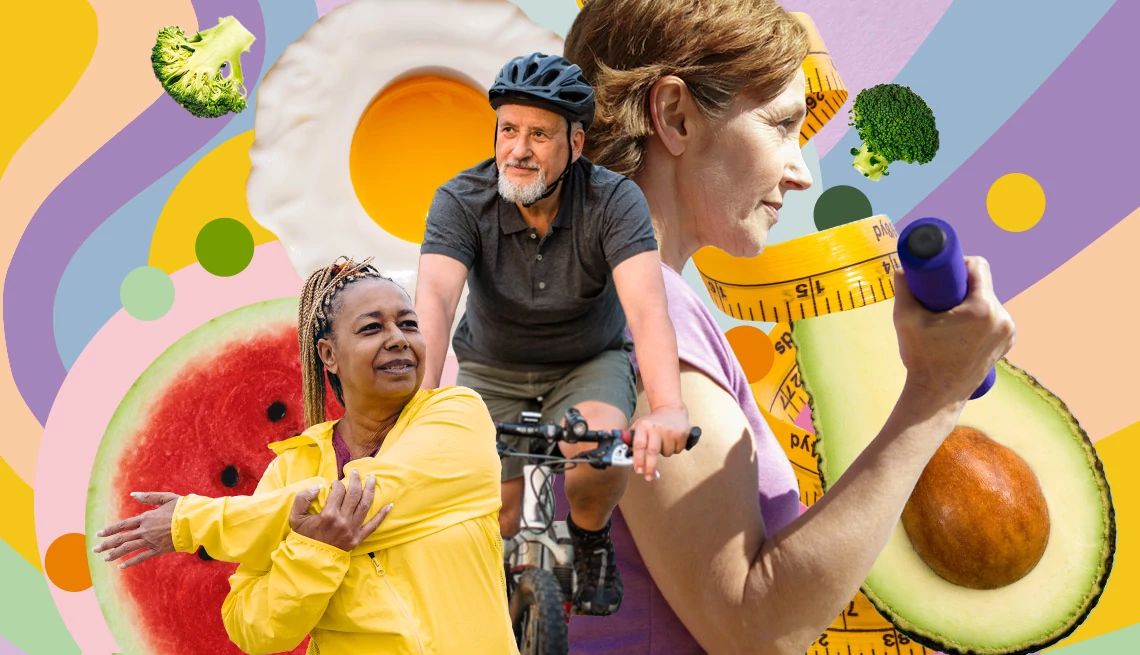A guide to healthy weight loss
A guide to healthy weight loss"
- Select a language for the TTS:
- UK English Female
- UK English Male
- US English Female
- US English Male
- Australian Female
- Australian Male
- Language selected: (auto detect) - EN
Play all audios:
Our bodies inevitably change as we age, and weight gain can be part of those shifts. As a result, older adults are increasingly susceptible to being swept up by the obesity epidemic
overtaking the U.S. According to the National Center for Health Statistics, 44.3 percent of people ages 40 to 59, and 41.5 percent of those 60 and older, are already considered obese.
Numerous lifestyle and physiological factors can make losing weight even more difficult than it was when we were younger. Medical conditions that affect energy, stamina and mobility can
affect our activity levels. Challenges sleeping, loss of muscle mass, and declining estrogen and testosterone can also be factors in weight gain after 50. Unfortunately, as the pounds
creep up, so do your chances for negative health effects. Being overweight or obese can put you at risk for health conditions like eye disease, type 2 diabetes, heart disease, stroke,
osteoarthritis, body pain and even cognitive impairment. With all the focus on weight loss drugs and surgery, it can be helpful to remember there are still science-backed approaches to
reaching or maintaining a healthy weight without prescriptions or direct medical intervention. Just be sure to consult with your health care provider on any new weight loss plans and
exercise routines before you begin. UNDERSTANDING YOUR BMI The first step on your weight loss journey may be taking a look at where your weight falls on the body mass index (BMI) scale.
Medical professionals use BMI to determine whether someone is considered underweight (below 18.5), healthy weight (18.5 to 24.9), overweight (25 to 29.9) or obese (30 or higher). BMI is your
weight in kilograms divided by your height in meters squared. It doesn’t measure important health factors such as the amount of muscle you have, your age or how you carry weight. WEIGHT
AND YOUR HEALTH AFTER 50 The relationship between our body and weight changes as we age, both in terms of gaining and losing weight, and shifts in what’s considered a safe weight. Being
obese and having visceral fat can pose particular health problems for people in their 50s, 60s, 70s and beyond. Read more about what weight and health means in your: It’s also important to
remember that a healthy weight number can be different for different people. Some research has shown that people who were normal weight in early adulthood and gradually gained some weight in
middle age and older (but did not get obese) can have the lowest mortality rates. The right weight for you should be determined in consultation with your doctor. If you are seeking to lose
weight, it’s important to approach your journey with a focus on positive health outcomes. Fixating on dieting and weight loss can lead to negative body image, low self-esteem, eating
disorders and malnutrition. Finding a weight management system that works for your lifestyle and that empowers you to feel your best and reach your goals is key to success. Calculate your
BMI and learn how factors like age, race and gender can affect results. HOW DO I LOSE WEIGHT FAST? We’ve all been tempted to drop pounds fast for a special occasion or the dreaded
weigh-in at the doctor’s office. But medical guidance recommends losing only 1 to 2 pounds per week, with the understanding that weight loss may fluctuate week to week. Losing weight too
rapidly can result in lost nutrients, negative changes to your metabolism and lost muscle mass, which can be especially concerning for older adults. A slower, steadier pace can result in
longer-term weight loss results and better health outcomes. It’s also important to not just focus on the scale, but to celebrate the increased muscle tone and stamina that can come from
exercise, along with better health measures like reduced blood pressure, cholesterol and sugar levels. The guide below offers science-backed expert advice on various tools and
recommendations to lose weight healthily and naturally.
Trending News
Explained | What is the state of Russian and US diplomatic missions?Newsletters ePaper Sign in HomeIndiaKarnatakaOpinionWorldBusinessSportsVideoEntertainmentDH SpecialsOperation SindoorNew...
Rajasthan Royals advance to play-offs, IPL 2015: Picture Highlights of RR vs KKRclick this icon for latest updatesList of Double Centuries in ODI Cricket Matches: Rohit Sharma Scores 208* Against Sri ...
Why i don’t blame planned parenthoodEditors’ note: Healing Hearts Ministries offers help through an intensive Bible study written for people still hurting ...
Satish sharma | va providence health care | veterans affairsSatish Sharma, M.D., was appointed Chief of Staff of Providence VAMC in March 2015 prior to moving into the role of Phys...
Is kfc and burger king open in lockdown?KFC and Burger King have had a hard time throughout the last 10 months, with restaurants forced to close on and off. The...
Latests News
A guide to healthy weight lossOur bodies inevitably change as we age, and weight gain can be part of those shifts. As a result, older adults are incre...
Senior or specialist worker visa (global business mobility)SENIOR OR SPECIALIST WORKER VISA (GLOBAL BUSINESS MOBILITY) Skip contents CONTENTS * Overview * Eligibility * How much i...
Vasnhs providing flu shots and encourages veterans to get vaccinated | va southern nevada health care | veterans affairsLas Vegas , NV — VA Southern Nevada Healthcare System is encouraging all Veterans to get their vaccination for the influ...
Nanoparticles versus the placentaPregnant mice treated 70-nm silica nanoparticles or 35-nm titanium dioxide nanoparticles suffer damage to the placenta a...
'i'm british in the us and got warning over parking rule i had no idea about'A COUPLE WERE LEFT BAFFLED WHILE IN NASHVILLE, US, RECENTLY AND HIRED A CAR AND PARKED IT IN A MULTI-STOREY CAR PARK. TH...
